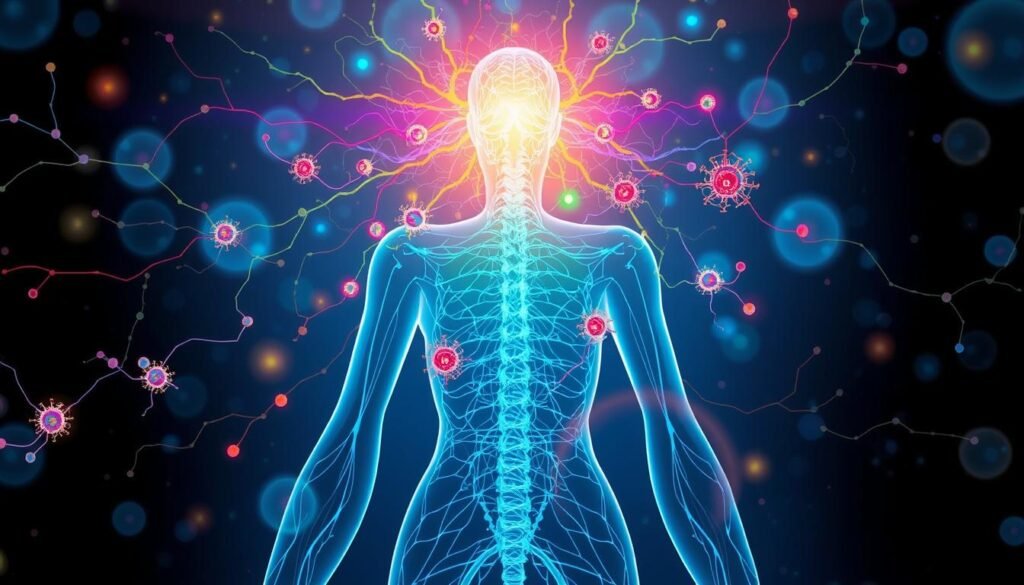Between 14% and 33% of U.S. adults have tried CBD, also known as cannabidiol. Its popularity is growing, especially among those looking for anxiety relief. Unlike THC, which is known for its “high,” CBD offers a natural way to manage stress and anxiety without that effect.
Research shows CBD interacts with our nervous system, particularly with CB1 and CB2 receptors. These receptors are important for mood control. The fact that CD can affect serotonin levels has made many interested in its potential for reducing anxiety. With ongoing studies, CBD is becoming a promising option for those needing help with anxiety.
Key Takeaways
- CBD is a popular option for anxiety relief, used by 14% to 33% of U.S. adults.
- It does not cause psychoactive effects like THC, making it suitable for a wider audience.
- Research has shown that CBD can lower anxiety in various studies, including those involving public speaking tests.
- Early studies indicate CBD may assist in managing symptoms of multiple anxiety disorders.
- As research on CBD continues, its applications could redefine anxiety treatment approaches.
Overview of Cannabidiol (CBD)
Cannabidiol, often called CBD, comes from hemp and marijuana plants. It doesn’t make you feel high. It works well with the body’s endocannabinoid system. This system plays a big part in managing mood, anxiety, and stress.
Learning about CBD’s qualities helps us see how it might help with anxiety relief.
Understanding CBD as a Cannabinoid
CBD is one among many cannabinoids in the cannabis plant. It is known for its health benefits. Unlike THC, CBD does not cause a high. It works gently with the body’s receptors.
This leads to a peaceful feeling without the psychoactive effects. Studies suggest CBD can lessen anxiety. It’s seen as a hopeful treatment for anxiety issues.
Difference Between CBD and THC
CBD and THC have different effects. CBD is known for its calming effect. On the other hand, THC can change perceptions and moods.
CBD is a good choice for those who don’t want THC’s anxiety or paranoia. It’s also safer, with fewer side effects. CBD’s value for anxiety treatment is growing as more research is done.
CBD and Its Mechanism of Action
Understanding how CBD works means looking at its effect on certain body receptors. It mainly interacts with CB1 and CB2 receptors in the endocannabinoid system. These receptors help control pain, mood, and how the immune system works.
Interaction with CB1 and CB2 Receptors
CBD targets CB1 receptors in the brain a lot. These receptors are key in managing anxiety and fear. By affecting CB1 receptor activity, CBD may help lessen anxiety. This offers hope for people with anxiety disorders. Then, there are CB2 receptors, found mostly in the body’s outskirts. They play a part in the body’s immune response and handling inflammation.
This shows CBD might do more than just ease anxiety. It could also affect other health issues positively.
Impact on Serotonin Levels
Another key point is how CBD influences serotonin levels. Serotonin is a major neurotransmitter that affects our moods. If serotonin levels are low, it can lead to mood disorders like anxiety and depression. By boosting serotonin signaling, CBD could help balance mood-related neurotransmitters. This could provide relief to those battling anxiety.
This link between CBD and serotonin shows it might be used in treating mental health conditions. It highlights CBD’s importance in today’s healthcare. For more detailed info, check out recent studies.

CBD for Anxiety Relief
Anxiety disorders affect one in five U.S. adults, making them a major health issue. There’s a rising interest in alternative treatments like cannabidiol (CBD). Many find CBD benefits calming, which may revolutionize how we manage anxiety.
Potential Benefits of CBD in Managing Anxiety Disorders
Studies indicate CBD could be beneficial for those with anxiety. It has been shown to lessen stress and boost sleep quality. People using cannabis for anxiety often choose CBD products. These items seem effective against various anxiety-related symptoms.
Studies Supporting CBD’s Anxiolytic Effects
Research on CBD shows it can lower anxiety. One study with 300 people examined different cannabis products. It found CBD products notably improved anxiety levels. CBD helps reduce anxiety signs and physical issues like fast heart rates. Many use cannabis for anxiety, sleep problems, and pain, showing its wide healing range.
| Product Type | Anxiety Reduction |
|---|---|
| THC-Dominant | Moderate |
| CBD-Dominant | Significant |
| Equal CBD/THC | Moderate |
| Non-Cannabis Control | Minimal |
More research on CBD’s anxiety-reducing effects is awaited. For those eyeing CBD for anxiety relief, it’s critical to understand how it differs from THC. Knowing this, including legal details and their impacts, helps make informed choices.

What is CBD and How Does it Help Anxiety?
Research on CBD shows it could help with anxiety. It seems effective against Generalized Anxiety Disorder (GAD), Social Anxiety Disorder (SAD), and PTSD. This suggests CBD can help in various situations.
Research Findings on Generalized Anxiety Disorder (GAD)
A 2022 study shows CBD might reduce anxiety symptoms by 60% to 70% after four weeks. This matches other clinical trial outcomes. It suggests CBD can really help people with anxiety.
CBD’s Role in Social Anxiety Disorder (SAD)
There’s strong evidence that CBD helps with Social Anxiety Disorder. A study with 24 SAD patients found that CBD lowered anxiety in public speaking. They felt less discomfort and cognitive impairment, showing CBD’s benefits in social stress.
Effectiveness in Treating PTSD Symptoms
For PTSD sufferers, CBD could be a game-changer. Research is looking into how CBD can ease symptoms like night terrors and distress from traumatic memories. Early results are promising, suggesting CBD could complement traditional PTSD therapies.

Dosage Considerations for CBD Use
Finding the right dosage of CBD for anxiety relief is crucial. Individual reactions can greatly vary. Starting with a low dose and slowly increasing it is often recommended. Most studies on humans have used doses from 20 to 1,500 milligrams (mg) per day. It’s observed that amounts between 300 mg to 600 mg are effective for anxiety.
When looking at CBD dosage, knowing the product concentration is key. Take a 10-mL bottle of CBD oil with 1,000 mg of CBD as an example. This type would give about 5 mg of CBD per drop. Following CBD usage guidelines is important for the best results.
It’s wise to talk to healthcare professionals when deciding on a CBD dosage. They can help make sure it fits your health needs without affecting other medications. With many different product formulations available, reading labels carefully is a must. This helps in understanding the wide range of CBD products.
The World Health Organization has found that doses up to 1,500 mg per day are generally safe. However, some might experience side effects like tiredness or changes in appetite. It’s important to consider things like age, weight, and specific symptoms when adjusting CBD dosage.
| Condition | Typical Dosage of CBD (mg) |
|---|---|
| Anxiety | 300 – 600 |
| Bowel Disease | 10 |
| Cancer-Related Pain | 50 – 600 |
| Parkinson’s Disease | 75 – 300 |
| Poor Sleep | 25 |
| Psychosis | 600 |
This table shows different CBD dosages from research studies. It highlights how important personal evaluation is in finding the right CBD dosage for anxiety relief.
Potential Side Effects of CBD
Many people turn to CBD for its health benefits. But it’s important to know the side effects of CBD too. Being aware helps users make better choices about using CBD.
Common Side Effects Experienced by Users
CBD is considered safer than many medications. However, some people may face side effects. These include:
- Fatigue
- Diarrhea
- Changes in appetite
- Weight fluctuations
These side effects differ from person to person. Knowing the side effects of CBD is key to managing them.
Interactions with Other Medications
If you’re taking certain medications, CBD might not mix well with them. This is especially true for meds with a “grapefruit warning,” like blood thinners and some antidepressants. It’s because CBD can change how these medications work. To avoid any problems, talk to a healthcare provider about any possible CBD interactions with medications.
Since the CBD market isn’t strictly regulated, product quality can vary. To stay safe, only buy CBD from trusted sources. This minimizes the risk of harmful effects.
| Side Effect | Description |
|---|---|
| Fatigue | Increased tiredness that may interfere with daily activities. |
| Diarrhea | Changes in bowel movements which can lead to discomfort. |
| Changes in Appetite | Variations in hunger or cravings experienced by users. |
| Weight Fluctuations | Unexpected changes in body weight over time. |
The Legal Status of CBD in the United States
The legal status of CBD in the United States is complex. It is shaped by federal rules and state laws. A key factor is whether the CBD comes from hemp or marijuana.
Hemp-Derived CBD and State Laws
The 2018 Farm Bill made hemp-derived CBD products legal federally if they have under 0.3% THC. However, states can set their own rules about CBD. This means some states have tougher restrictions or even bans on certain CBD products. To avoid problems, it’s important to know your local laws about CBD. The legal status of CBD can impact where and how you can get these products.
Federal Regulations and CBD Products
Federal rules greatly affect the CBD market. Except for Epidiolex, a treatment for specific conditions, most CBD products don’t have FDA approval. It’s illegal to sell hemp-derived CBD as dietary supplements or medication without FDA approval. This makes it hard for consumers to find safe, regulated products. It also challenges businesses. Companies have to understand federal and state laws to sell CBD products. As the market changes, keeping up with these rules is crucial for understanding hemp-derived CBD.
| Factor | Description |
|---|---|
| 2018 Farm Bill | Legalized hemp-derived CBD with |
| State Regulations | States can impose stricter laws or bans on CBD products. |
| FDA Approval | Only Epidiolex is FDA-approved for specific medical use; other products lack this status. |
| Consumer Compliance | Important for individuals to understand local laws regarding CBD. |
How to Buy CBD Oil for Anxiety
Buying CBD oil for anxiety is pretty simple, but you need to pay attention. The rise of interest in CBD has brought many options to the forefront. Knowing how to choose involves looking for quality and genuine products. This is key for effective relief.
Choosing Quality CBD Products
Identifying top-quality CBD products is crucial. Focus on items that are:
- Third-party tested: This step checks the CBD oil’s purity and strength. It makes sure the oil has the CBD it says it does and is clean.
- Properly labeled: Labels should have clear info on doses, where ingredients come from, and how they’re made. This tells you a lot about quality.
- Derived from hemp: Hemp-based CBD is usually safer and has low THC. It follows U.S. laws that keep THC under 0.3%.
Picking the right CBD is about avoiding poor products that won’t work well. Looking up what others say about the brand can guide your buying decision.
Online vs. Local Dispensaries
Online shops and local dispensaries each offer benefits. Your choice depends on what you need. Buying online gives:
- Convenience: You can find a wide variety of quality CBD from different brands.
- Discreetness: It’s an easy way to shop without the pushy salespeople.
Local dispensaries offer other advantages:
- Personalized guidance: The staff can suggest products that fit your specific needs.
- Immediate product access: You can use what you buy right away, no waiting for delivery.
Whether buying online or in person, remember: quality is most important for CBD oil that helps with anxiety.
Conclusion
CBD for anxiety is seen as a hopeful new option for people suffering from anxiety disorders. Anxiety affects more than 30% of people at some point in their lives. Yet, standard treatments don’t always work well, helping only about 40-60% of those who try them.
Studies on CBD are showing its potential to help with anxiety, especially for those who haven’t had much success with other medications. It appears CBD could be a good alternative or additional treatment option.
Even though we need more research to find the best doses and long-term results, the early results are promising. CBD is safe to use and doesn’t have a high risk of misuse. Many are trying CBD to help with symptoms of different anxiety-related conditions.
If you’re thinking about using CBD, it’s important to stay well-informed. Always talk to healthcare professionals to make sure it’s safe and right for you. As we learn more about CBD, we’ll understand better how it can support mental health.